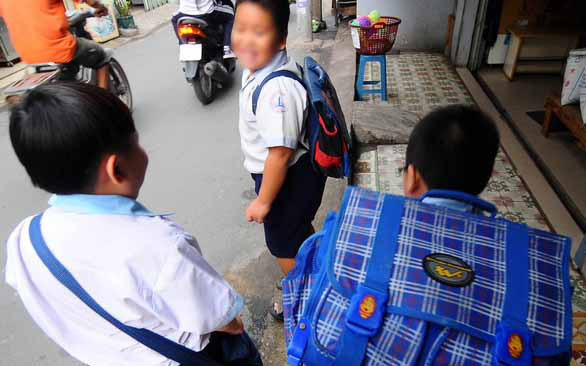 Schoolchildren are seen in this photo taken in Ho Chi Minh City. Photo: T. T. D. / Tuoi Tre
Schoolchildren are seen in this photo taken in Ho Chi Minh City. Photo: T. T. D. / Tuoi Tre
Misconception about raising children have caused consequences for the kids in Vietnam, as many local parents tend to consider their sons and daughters ‘prodigies’ of multiple talents and make them learn things they do not desire to at a very young age.
Le Thi Hoa, a resident in Ho Chi Minh City, forced her three-year-old son to learn to play the piano only because she realized that he is fond of watching music videos on YouTube.
The mother believes that her son is a “gifted musical talent,” for he knows and recognizes several music hits on YouTube.
But the boy only expresses strong opposition every time he attends the piano lesson as he is not really into the musical instrument.
Hoa also made him join art and English classes just because he could identify colors and name them in English, causing her to have the same misbelief that he would excel in these subjects.
The mother would even react negatively to others’ constructive advice on the path she prepared for her child, which many believe to be inappropriate for a kid that has just entered nursery school.
“I was only ‘awakened’ when he showed clear signs of emotional stress, having had to learn things he did not like,” Hoa recalled the biggest mistake of her life.
Another Ho Chi Minh City citizen named Hai set a strict weekly timetable for his daughter to study computing, chess, different forms of art and English out of his own belief that children best develop their ability between ages three and six.
As a result, the poor girl suffered from physical symptoms of stress and slight autism, prompting his family to consult a psychiatrist for her special treatment.
According to scientific proof, children develop their abilities of language or art from three to six years old.
But this period is also when children are mentally vulnerable, and any psychological trauma that happens to them during this time could lead to negative consequences in the future.
Children at this stage of life grow up better in mentally friendly environments where they get to enjoy social activities and experience self-exploration compared to those who are under parents’ auspices, according to experts.
Parents are advised to consult experts on child orientation when they discover a sign of special talent in their children to prevent them from getting into mental disorder, since compulsion is never the key to a child’s complete development.

























